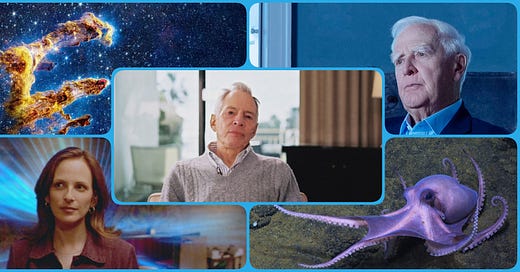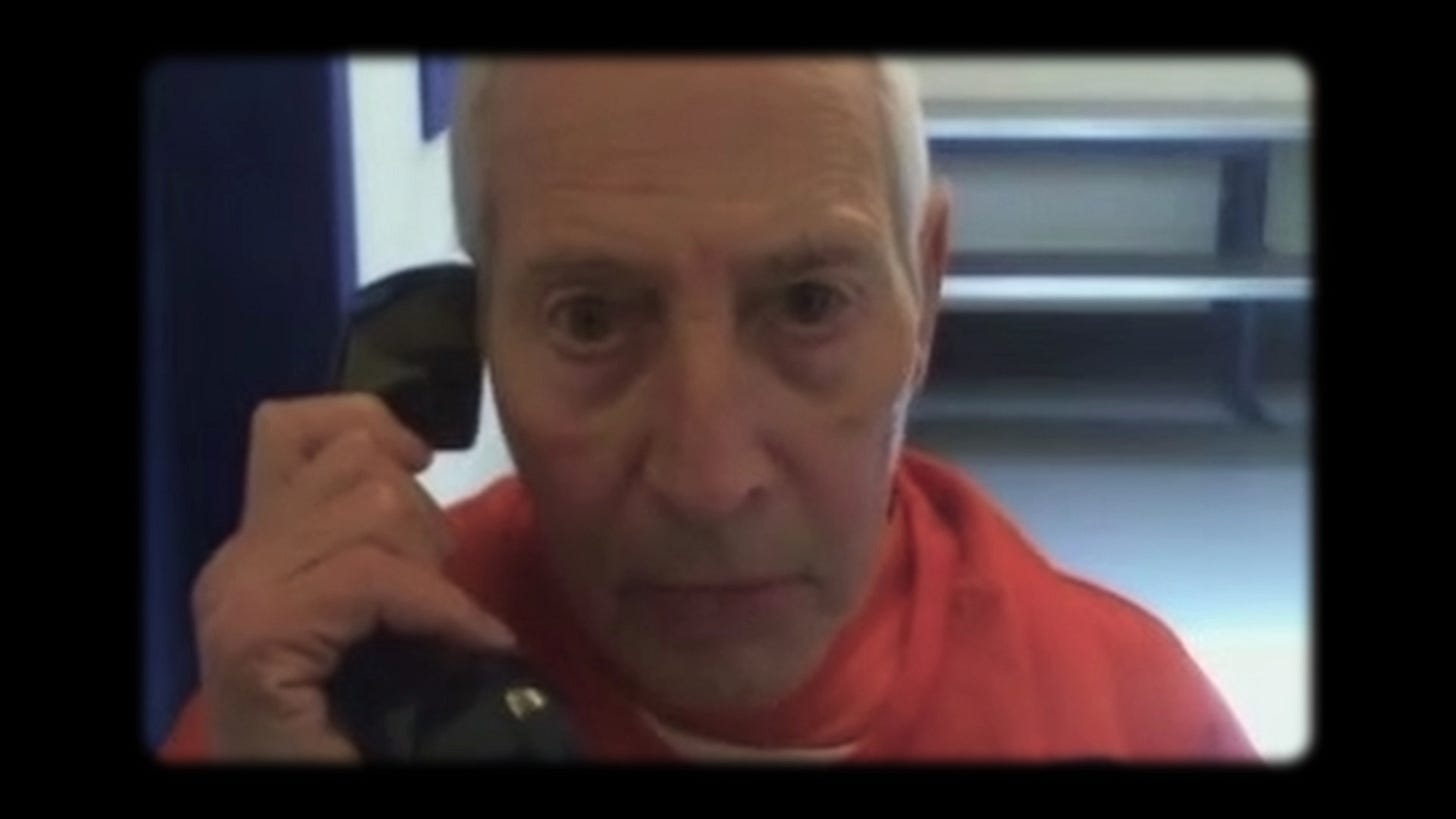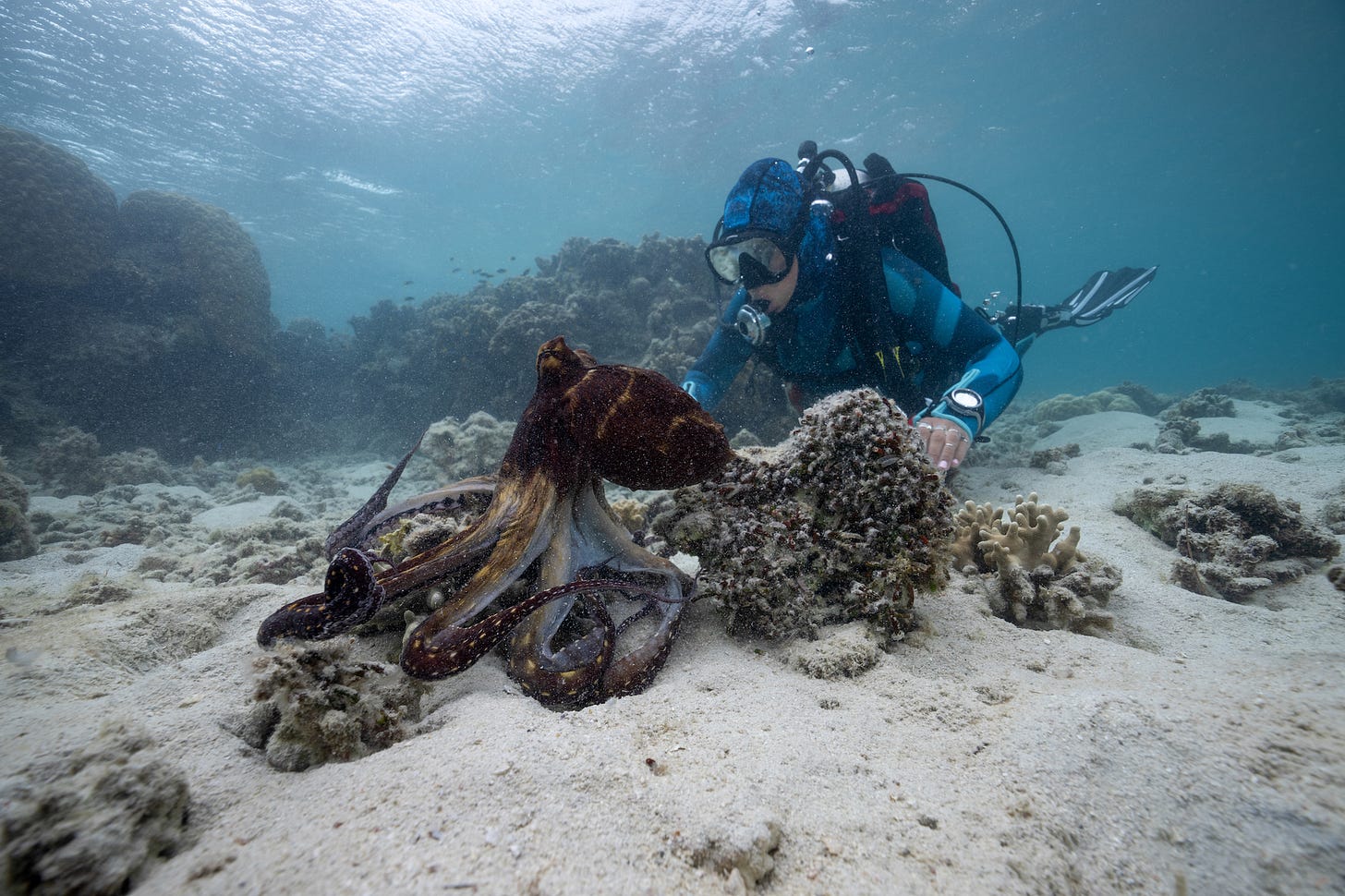This Week In Documentary
Theatrical & Streaming Releases - New & Recommended - April 19-25, 2024
Welcome to another edition of The Week in Documentary as we continue through April and celebrate another Earth Day. After more than 50 years, the occasion still calls for viewings of nature documentaries, films about climate change, surprising documentaries about the environment, and spotlights on environmental disasters. But the best movies to watch on Earth Day are documentaries about Earth. After all, it’s the planet we’re celebrating. Still, a lot of channels and streaming platforms have their own programming for the day, and some of Disney’s new additions to the nature doc canon are among our highlights this week. There’s also a special one-night-only event at AMC Theatres to look for — check out our listings to find that one.
Another special occasion this week is happening the day after Earth Day. It’s the joint birthday of Chris Hegedus and Michael Moore. Both are incredibly influential documentary filmmakers, with very different styles. The former is best known for her professional partnership with husband D.A. Pennebaker, with their most prominent films together including The War Room, Town Bloody Hall, Kings of Pastry, and Jim Plays Monterey, all of which are now streaming on The Criterion Channel. They also co-directed Unlocking the Cage (on Kanopy) and Depeche Mode 101 (Showtime). Moore is famous for his provocative first-person investigatory documentaries, such as Fahrenheit 9/11 (Kanopy, Tubi, and Peacock), Bowling for Columbine (Kanopy, Tubi, PlutoTV, and MGM+), Sicko (PlutoTV), Fahrenheit 11/9 (VOD), and Roger and Me (VOD).
Speaking of anniversaries worth celebrating, a few movies have birthdays of their own this week. April 21 marks 35 years since Bruce Weber’s Chet Baker film Let’s Get Lost was released. Jonathan Demme’s iconic Talking Heads documentary, Stop Making Sense (currently for sale digitally), which tops our list of the best concert films of all time, turns 40 years old on April 24. Maya Deren’s short experimental film Meditation on Violence (now streaming on Kanopy) turns 75 on April 21. Finally, Robert Flaherty’s Man of Aran (streaming on Tubi, Plex, Shout! TV, Amazon Freevee, and The Criterion Channel) turns 90 on April 25.
Nonfics Pick Of The Week: The Jinx - Part Two (2024)
Nearly a decade after the shocking conclusion of The Jinx: The Life and Deaths of Robert Durst, what more could be said about its subject, who died in prison in 2022? He accidentally confessed in the 2015 documentary series, and that was that, right? Well, it’s just like how mystery movies end with a reveal of whodunit but never get into the legal case that follows. The Jinx - Part Two shows us what happened after Durst was apprehended, thanks to the events shown in the original installment, including the further investigation, the trial, and its aftermath. HBO has only shared the first four new episodes of the sequel series (or is it Season 2?), meaning there’s likely some more revelations to be found in the second finale.
From the first four episodes of The Jinx - Part Two, I can assure you at least of more quality television, regardless of how it continues or concludes. There’s a lot more of Robert Durst, this time in footage of prison visits from his friends. There are plenty of more details and additional facts about the murders of Kathie Durst and Susan Berman. There are intriguing new characters, such as Durst’s old pal and former X-rated “Country Porn” rocker Nick “Chinga” Chavin, and other significant figures, like Los Angeles Deputy District Attorney John Lewin. The series also interviews Durst’s defense attorneys, which provides a more rounded explanation of the legal proceedings and how different witnesses and evidence helped or hurt each sides’s arguments. It’s a fascinating real-life courtroom drama with enlightening commentary.
The first episode of The Jinx - Part Two premieres on HBO on Sunday, April 21, at 10 pm ET/PT and will stream on Max starting at the same time. Subsequent episodes air each Sunday through May 26.
Other Documentary Highlights
Deep Sky (2023)
Kudos to all the theaters clearing their IMAX screens of blockbusters like Dune: Part Two and showing a documentary, albeit a short one. Deep Sky is the latest IMAX film to venture into space (see our list of the best documentaries about space travel for some classic examples). Directed by Oscar-nominated filmmaker Nathaniel Kahn (My Architect), the 39-minute doc shares footage captured via NASA’s new Webb Telescope and with narration by Michelle Williams tells a story of the cosmos, including the origins of the universe. Deep Sky is now in theaters for one week only. While I haven’t yet seen the film — it didn’t seem to be screened around me for critics — I do have tickets for this weekend and will share some thoughts here afterward.
Update: After seeing the film, I have to admit it’s a bit different than I expected, but not in a bad way. It’s not just about the images captured through the telescope and what they show and mean. It’s a documentary about creation and discovery, and it leaves us wondering about the significance and insignificance of human progress. Some of my favorite parts were from interviews with people involved with the Webb Telescope, such as astrophysicist Amber Straughn, who has an emotional moment talking about one of the images. I’ll always enjoy documentaries featuring interviews with scientists because they are so excited about their work and what it achieves.
Little Empty Boxes (2024)
This week’s reviews newsletter was a bit thin in terms of the quantity of titles, but I went pretty long on Little Empty Boxes. The film, directed by Max Lugavere and Chris Newhard, chronicles Lugavere’s journey toward understanding his mother’s cognitive decline and how it could have been prevented. It’s an imperfect documentary but an interesting one, particularly in the way it’s partly an issue film enveloped within the personal, character-driven narrative. In our review of Little Empty Boxes, I acknowledge that it “gets its message across in a less direct manner than a lot of films, and that’s a good thing. It’s not so understated as to enter subliminal propaganda territory, and it’s not so overbearing that it makes the surrounding story seem trivial in relation to the big picture.”
Secrets Of The Octopus (2024), Tiger (2024), & Tigers On The Rise (2024)
Earth Day traditionally brings out a new Disneynature documentary, and they tend to be released only to streaming and not theaters now. I would have liked to see Tiger on the big screen, as these films always feature astounding cinematography, but it’s recommended regardless. Tiger follows a narrativized look at Tigers living in the forests of India with a specific focus on a mother and her cubs. The film is narrated by Priyanka Chopra Jonas and its mostly conventional Disneynature score is appropriately infused with sounds from Indian music. For an even deeper and more genuine look at the making of this film and tigers of India, Disney is releasing a companion documentary titled Tigers on the Rise on the same day — April 22 — that also looks at the increased tiger population.
One day before Earth Day, Disney has another nature documentary hitting streaming services that’s even better, this one courtesy of National Geographic and producer James Cameron. Secrets of the Octopus, which is part of an ongoing Secrets of… franchise, contains three episodes, each narrated by Paul Rudd, that showcase the magnificent qualities of various types of octopuses around the world. It’s not a Disneynature type series, as it also includes human scientists and divers studying these creatures and offering occasional commentary. There’s not much narrativizing, though one of the central octopuses is given a name, Scarlet. As it shows octopuses’ cognitive capabilities, as they link to traits of camouflage, mimicry, problem-solving, self-awareness, and more, you’ll find a new appreciation for these unique animals.
What the #$*! Do We (K)now!? (2004)
While I highlighted most of this week’s big documentary anniversaries in the introduction to this newsletter, one needs additional space. However, I’m not really meaning to showcase the film What the #$*! Do We (K)now!?, which turns 20 years old on April 23, so much as Roger Ebert’s review of this documentary, published later in the year. The famous film critic wrote on the film as if it was an expert exploration of quantum physics (and I swear gave it more than the two-and-a-half stars currently atop the review), only to be corrected afterward and acknowledged in a few of his Movie Answer Man columns. One reader noted that the talking heads were not experts in the field of quantum physics. Another called the doc a hoax and an advertisement for a New Age religion. The filmmakers defended its substance as presented, as did yet another reader.
This was the first time, just as I was starting my career as a film critic, that I saw not only another writer corrected so in depth but a documentary called out for presenting information a certain way. I’m not going to say deceptively because it is what it is. I had never really thought about media literacy before this documentary, which I also saw and enjoyed at the time as someone fascinated by quantum physics and metaphysics. I haven’t stopped thinking about it and Ebert’s extended discourse since. We need to look at documentaries more closely and not take all their information at face value or their talking heads as the most expert persons on the subject. We also need to not dismiss documentaries that aren’t necessarily factual information vehicles. No film of any kind needs to be any more “real” than Young Einstein.
Whatever is true or expert or not in What the #$*! Do We (K)now!?, it’s a film that makes the viewer think differently about a lot of things. In the last 20 years, we’ve had more documentaries that explore theories and perceptions. Room 237 comes to mind. The important thing is that we know what we’re looking at, either going into the film or afterward. Yes, some documentaries are going to fool us or deceive us, intentionally or not. This has been happening since the beginning of cinema. Some documentaries are propaganda, some have an agenda, and others are literally selling something. Few are perfect in their authenticity or truthiness. I have What the #$*! Do We (K)now!?, Roger Ebert, and his readers to thank for helping me to see this.
WGA Award Winners
Finally, we have some award winners to celebrate this week. Last Sunday, the Writers Guild of America West and Writers Guild of America East held its annual WGA Awards ceremony and announced this year’s winners in fiction and nonfiction categories. Errol Morris’s The Pigeon Tunnel, about spy-turned-novelist John le Carré, received the honor in the Documentary Screenplay category, with Morris himself recognized. Dayton Duncan received two awards. He had the Best Documentary Script - Current Events with “Episode One: Blood Memory” from Ken Burns’s docuseries The American Buffalo, and he won in the Best Documentary Script - Other Than Current Events category for writing “Episode Two: An American (1775 - 1790)” from Burns’s two-part doc Benjamin Franklin.
Documentary Release Calendar 4/19/24 - 4/25/24
Keep reading with a 7-day free trial
Subscribe to Nonfics to keep reading this post and get 7 days of free access to the full post archives.







